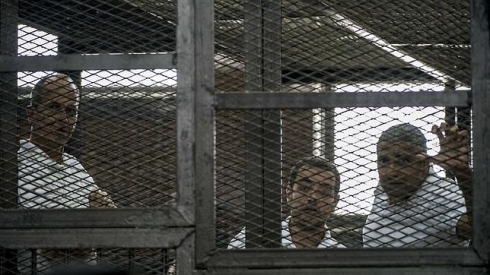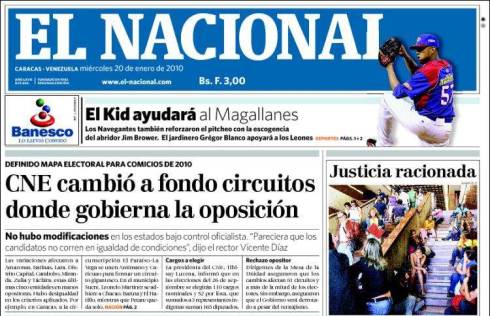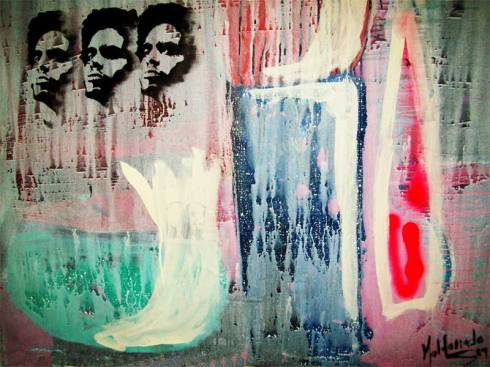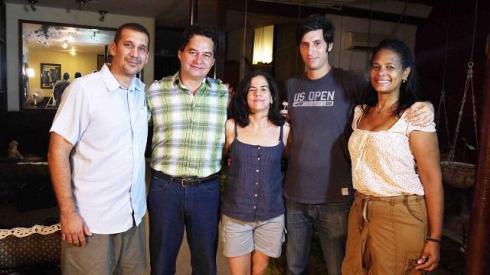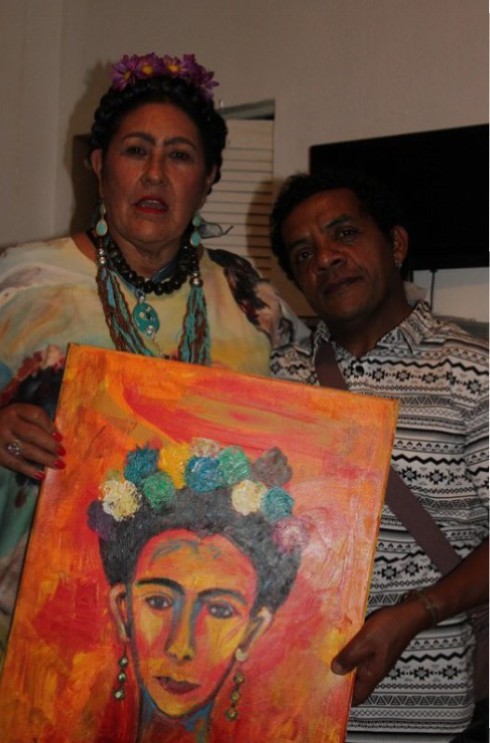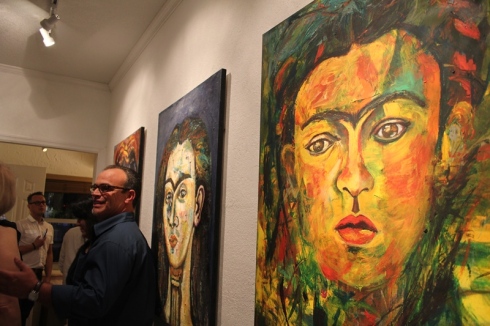Luis Felipe Rojas, 11 January 2016 — Her friends call her Elisa, it’s that simple. She is an Argentinian writer, editor, ceramics artist who got so involved in the case of the Cuban writer Angel Santiesteban that she ended up redesigning his blog, The Children Nobody Wanted, and wrote to Amnesty International and Reporters Without Borders, to help them to visualize the irregularities in process repeatedly divorced from reason, but that sent Santiesteban to prison at the beginning of 2013.
Between that date and his release in 2015, while she posted the letters and articles of the Cuban novelist in “The Children…”, Elisa Tabakman was cooking animals and rare and beautiful creatures over a slow fire, with pieces of glass and wire. When the oven temperature drops out of the oven come cats and fish now celebrating life.
These big-eyed beings sent the imprisoned writer a message of encouragement to speak in front of Raul Castro. I met her through my colleague Amir Valle and since then I go to her Facebook wall and to her blog Elisa Tabakman Metal y Piedra. There I see that the blows and the dungeons haven’t left my friend and brother Angel Santiesteban all alone.
Tell me about your background, how did you come to this mixture of techniques.
I’m a fire artist, all, or almost all, the techniques of my work are covered in what is known as the fire arts: ceramics, glass, iron, jewelry. All the materials involved pass through fire, because even in my mosaics fire is involved, whether it’s stained glass or figures in iron or silver. You could almost say that if you pass through the path of the fire it is inevitable you will involve yourselves in all of its arts and possible techniques.
Fire is magic, fire purifies, fire transforms. Fire is what converts things in alchemy techniques. When you trap fire, you can never abandon it. In fact, I was 8 when I started studying ceramics, later, starting at 14, I trained for long years at the National Ceramics Schools, and I had some experience in stained glass at that time, until come years ago I went to direct fire with a torch, making contemporary jewelry, and then returned to the path of glass but researching and experimenting and sculptural techniques and in fused glass.
And again I embraced the techniques because the jewelry I was making with silver and precious stones asked me… and this is my current work, parallel to the works I continue doing and displaying. The training of an artist never ends, either through taking specialized seminars or experimenting, but it is an endless process.
Why are animals the central motif? What moves you to engage in artistic creation?
I love animals especially, I don’t understand life without animals. They are the best thing that could happen to us and ironically, we are the worst thing that can happen to them. The love and communication with animals humanizes us. We learn from the to respect others, their vital space, their times and needs. But especially, we learn from animals that unconditional love exists, they loyalty exists and that there is a true relationship that lasts for life.
In animals we don’t expect evil, self-interest or selfishness. We can fail the animals because we tend to be with them like we are with our fellow human beings, but they never will do that to us. And I have a very idealized perspective of human beings, I represent the values I would like for us with animals. Even with the most terrible issues I have a positive and optimistic vision, a vision of real life that flies in the face of reality.
But art tries to express feelings, ideals, create awareness… so it is not my intention to construct my messages with them, they just emerge from me. And I feel like I recognize them. If you look carefully, the most horrendous dramas that humanity suffers, the animals suffer, because we have them living with us and they also die of hunger, bombings, floods, on rafts or in wars… in those in their natural environments are victims of human cruelty, either because we destroy their habitat or because we hunt them without mercy.
Animals are so marvelous that I also owe to them having found my want to express what I feel or am trying to express.
The use of glass and metal make you go back to the origins, especially when your motives are figurative. Do you not call the art conceptual and abstract, which has become every more “fashionable.”
Honestly, I believe that art is abstract; art is always a representation, more or less ties to the real image of what it represents. There is no art without abstraction, and at the same time there is always an intellectual or emotional elaboration. In my case, “abstract” art doesn’t work for me as an expressive language, I don’t see how to represent the drama of a concentration camp, or the drama of the refugees, or whatever it is, it is not with “figurative” elements or high symbolic value.
And it is not just ab out how one uses this language to express it; I believe that it is fundamental that works that have a strong social commitment be “accessible” to the readings of the “spectators”; if not we have more or less beautiful “objects” (taste is always relative) but we are not doing what I understand as art. The rest, of course, is always respectable, if it doesn’t allows a dialog with the viewer and it doesn’t spark feelings, and it only awakes a great aesthetic appreciation, it is “decorative art,” which I would always flee from.
It’s very difficult for me to make utilitarian objects, it horrifies me, working them technically and designing them with no expression; so I know that is not my way although from the economic point of view, clearly I should choose that option.
Your work is halfway between literary editing and Human Rights activist. What do you do to combine this?
I came to the world of editing because I was always a fanatic reader and devoted to books and the worship of the “object” of the book led me to pursue a graduate degree and editing and worked for many years in the most important publishers. There is no work more gratifying than that which allows us to enjoy what we do, and this is true in my case.
Reading is a key trigger in artistic creation, there is nothing like reading to awaken our imagination. The same thing happens to a writer who can never stop reading the work of others to enrich their own production. What in the intellectual world is called “intertextuality” also exists in the world of plastic arts; we are a product even of the genetic memory of our species.
In every artist there is a germ of those who painted the caves of Altamira, the artistic expressions of all peoples of the world, and more recently, individual artists. Throughout history we have had the same need to express, to ask, to thank; it started in the walls of the caves, and we continue it today with many techniques and materials, but the human need was, is and will be the same.
In my case, for multiple reasons and personal experiences, my expressive needs landed on the issue of human rights, of human dignity. But it was not reduced to that but to the feedback with a strong commitment to it and that’s what I spent years doing, not without problems, sacrifices, injustices and misunderstandings. but, aware of being on the right side of History, I resisted everything, not without pain, but I have resisted it.
I always thought I was in a privileged place, to be fighting for those who need help not being one who needs it. So every time I thought I would collapse, I thought about those who needed me, and the conclusion was always the same: if there are those bearing the unbearable and I owe my commitment to them, how can I not bear insults, insults and threats?
Each time I felt I couldn’t do it any more, I thought about the reality of facing prison, torture, persecution and the complete lack of freedom and legal guarantees. And I grew with each disagreeable episode, and curiously, in every moment of these I did my best work.
I feel privileged to be able to do committed art but even more to accompany it with a real commitment to the victims of what I am denouncing. My only regret is not being able to do more; these years of struggle have also make me aware of how limited we are no matter how infinite our effort. But as the Talmud says, “He who saves a life, saves humanity.”
And this is the guiding principle of my life. In the case of Angel Santiesteban, I also help humanity to continue to have an excellent writer, who is so committed to his art, he paid with his freedom, and worse still, he could pay with his life. Caring for Angel, caring for a human being and a great artist.
















